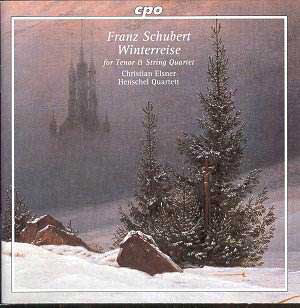With the passing of time, and the greater focus on
the feelings of the individual in the intellectual aftermath of the
French Revolution, the developing romantic impulse gave the composition
of lieder a greater priority. And in the longer term still, Schubert's
output of more than six hundred songs established both a repertoire
and an artistic frame of reference. Later composers built upon, and
sought to emulate, his achievement, though none has ever surpassed it:
Schumann, Brahms, Liszt, Wolf, Mahler, Strauss ...
Beyond the huge number of wonderful individual songs,
Schubert also confirmed a new genre that had begun just a few years
before with Beethoven's An die ferne Geliebte (1816): the song
cycle comprising a series of songs on a common poetic theme. Schubert's
two celebrated examples of the genre, Die schöne Müllerin
(1823) and Winterreise (1827), are based on the poetry of
Wilhelm Müller, Imperial Librarian in the Academy at Dessau. In
October 1815 the poet had written: 'Courage! A kindred soul may be found
who will hear the tunes behind the words of my poems, and give them
back to me.' That kindred soul was Schubert but, alas, Müller died
shortly before the completion of Winterreise.
Winterreise was conceived, significantly, for
a duo combination of voice and piano. The present arrangement with string
quartet and tenor was the brainchild of the singer, Christian Elsner,
and there is no question of either his or the Henschel Quartet's commitment
to the cause. Nor is the arrangement by Jens Josef lacking in either
skill or taste. The recording is of excellent quality, so too the general
presentation by CPO. So far, so good. But can the disc be recommended?
The answer is a qualified 'no'. For the essence of
this music is so bound up with the original concept, the more so in
an extended cycle than an individual song, that to rearrange it is to
assault its special nature. Not that others have not previously tried,
including a well known mixed ensemble version by Hans Zender. But the
present release is more likely to be of interest and value to Schubert
aficionados; that is, to those who know and love the music already,
and want to explore other approaches to it.
Christian Elsner is a talented singer and his vocal
qualities do bring insights and satisfaction to this great work. But
the combination of voice and string quartet does not work anything like
so well as the combination of voice and piano. Too often the results
are bland, or pizzicati are forced to substitute for a clear rhythmic
impulse. To be sure, there are plenty of effective moments, for example
the rich toned cello beneath the ensemble in 'Erstarrung', the
muted timbres accompanying 'Rast' (perhaps the highlight of the
performance). However, these points of interest merely serve to underline
how wonderful is the piece in its original form as one of the greatest
achievements of Schubert's miraculous yet tragically short life.
Schubert's friend Josef von Spaun described the scene
late in 1827 when Schubert first presented Winterreise to his
friends and supporters: 'Schubert had been in a gloomy mood for some
time and seemed unwell. When I asked him what was wrong, he would only
say, 'Now you will all soon hear and understand. I shall sing you a
cycle of frightening songs, which have taken more out of me than ever
was the case before.' We were taken aback by the dark mood of these
songs, but Schubert said, 'I like these songs better than all the others
and you will like them too.' And he was right; we were soon enthusiastic
about the impression made by these melancholy songs, which Johann Vogl
sang in a masterly way.'
There is no question that Schubert's commitment to
this cycle of twenty-four songs had everything to do with his own personal
crisis, particularly the intensifying illness which would kill him the
following year at the age of just thirty-one. The project dominated
his artistic priorities, and its true rewards as a work of art remain
in the duo format that Schubert originally conceived. Imitations may
be interesting, but they do remain imitations. Why bother, when it is
possible to visit and revisit the real thing?
Terry Barfoot


